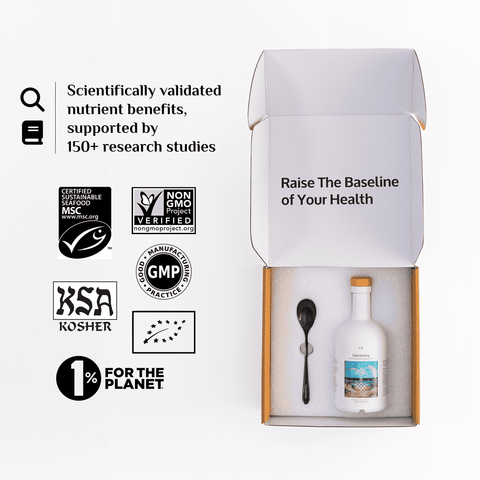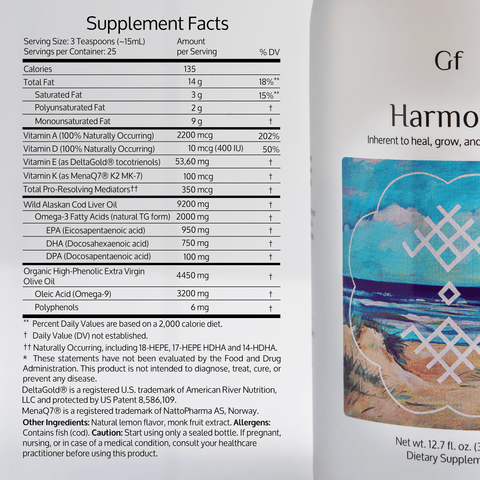When it comes to healthy fats, Omega-3, Omega-6, Omega-7, and Omega-9 fatty acids are essential players in supporting various functions in your body. While many people are familiar with Omega-3 and Omega-6, Omega-7 and Omega-9 often fly under the radar, even though they also provide impressive health benefits. In this post, we'll explore what each of these fatty acids does for your body, why they are important, and how to get them through your diet or supplements.
What Are Omega Fatty Acids?
Omega fatty acids are a group of polyunsaturated and monounsaturated fats that are crucial for your body’s functioning. They contribute to everything from reducing inflammation and supporting heart health to improving skin and brain function. While some of these fats are essential, meaning your body can’t produce them and you need to obtain them through diet, others can be synthesized by the body.
Omega-3 Fatty Acids: The Inflammation Fighters
Key Benefits:
-
Heart Health: Omega-3 fatty acids are well-known for their heart-protective properties. They help lower triglyceride levels, reduce blood pressure, and prevent the buildup of arterial plaque, lowering the risk of heart disease and stroke (source).

- Brain Function: Omega-3, especially DHA (docosahexaenoic acid), is critical for brain health, supporting cognitive function and potentially lowering the risk of age-related mental decline (source).
- Inflammation Reduction: EPA (eicosapentaenoic acid), another form of Omega-3, is essential in reducing inflammation in the body, which can lower the risk of chronic diseases such as arthritis and heart disease (source).
Sources of Omega-3:
- Fatty fish like salmon, mackerel, sardines
- Flaxseeds and chia seeds
- Walnuts
- Algal oil (a plant-based source)
Omega-6 Fatty Acids: The Energy Providers
Key Benefits:
- Cell Growth and Repair: Omega-6 fatty acids are important for cellular function, playing a role in the structure of cell membranes and promoting healthy skin and hair.
- Energy Source: Omega-6 fatty acids are primarily used by the body for energy, making them vital for overall vitality and performance (source).
- Inflammation Balance: While Omega-6 fatty acids can be pro-inflammatory in high amounts, they play a crucial role in regulating inflammation, which is necessary for immune responses and healing (source).
Sources of Omega-6:
- Vegetable oils (such as sunflower, safflower, and corn oil)
- Soybeans
- Nuts and seeds
- Poultry
Omega-7 Fatty Acids: The Skin and Mucous Membrane Protectors
Key Benefits:
- Skin Hydration and Elasticity: Omega-7 fatty acids, such as palmitoleic acid, are renowned for supporting skin health by maintaining moisture and improving elasticity. This makes them particularly beneficial for individuals with dry or aging skin (source).
- Mucous Membrane Health: Omega-7 is also essential for maintaining the health of mucous membranes in the digestive tract, respiratory system, and urinary system, helping protect against conditions like dry eyes and mouth.
- Metabolic Support: Omega-7 may play a role in regulating fat metabolism and insulin sensitivity, which could help in managing weight and preventing metabolic disorders like diabetes.
Sources of Omega-7:
- Sea buckthorn
- Macadamia nuts
- Anchovies and other small fish
Omega-9 Fatty Acids: The Heart Health Boosters
Key Benefits:

- Cardiovascular Health: Omega-9 fatty acids, primarily oleic acid, are monounsaturated fats known for promoting heart health. They help improve cholesterol levels by raising HDL (good) cholesterol and lowering LDL (bad) cholesterol, reducing the risk of cardiovascular diseases (source).
- Anti-inflammatory Properties: Omega-9 also has anti-inflammatory benefits, helping to reduce the risk of chronic diseases like diabetes and inflammatory disorders.
- Energy Regulation: Omega-9 fats are a good source of energy and can help regulate blood sugar levels, making them beneficial for managing conditions like type 2 diabetes.
Sources of Omega-9:
- Olive oil
- Avocados
- Almonds
- Cashews
How to Get the Right Balance of Omega Fatty Acids
While all Omega fatty acids are beneficial, it’s important to maintain a proper balance. The modern Western diet tends to be high in Omega-6, which can lead to an imbalance that may contribute to inflammation. Ideally, you want to increase your intake of Omega-3s while moderating Omega-6s to promote optimal health. A balanced ratio of Omega-6 to Omega-3 fatty acids ranges from 1-to-1 to 4-to-1, yet on a typical Western diet individuals may ingest a ratio of 15-to-1 to nearly 17-to-1 (source).
Tips for Balancing Your Omegas:
- Eat More Omega-3 Rich Foods: Increase your consumption of fatty fish, flaxseeds, and chia seeds.
- Moderate Omega-6 Intake: Be mindful of your intake of processed vegetable oils, which are often high in Omega-6.
- Supplement Wisely: If you aren’t getting enough Omega-3 or Omega-7 through your diet, consider supplements. Make sure to choose high-quality sources with balanced EPA and DHA levels. Check out our own Harmony™ omega-3 supplement which provides with more than 2000mg of high-quality EPA + DHA.
Conclusion: The Benefits of Omega 3, 6, 7, and 9
Each type of Omega fatty acid—Omega-3, 6, 7, and 9—plays a unique and important role in your health. From reducing inflammation and supporting heart health to improving skin elasticity and boosting energy, these fats are essential for overall well-being. By understanding what each one does and how to incorporate them into your diet, you can enjoy the full spectrum of their health benefits.









